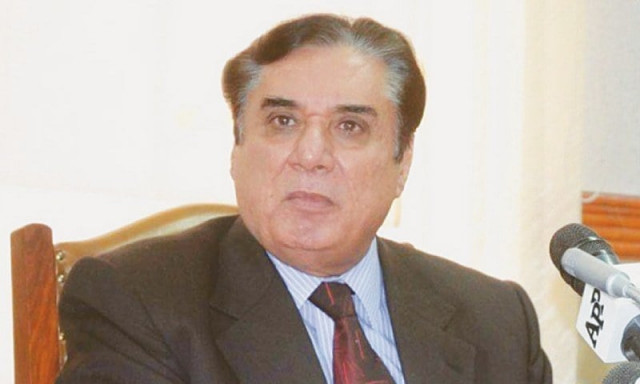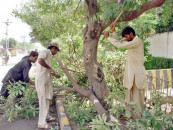Judiciary wants say in NAB chief’s appointment
SJC says top court hasn’t ‘receded’ from its suggestion of consulting with CJP on matter

The Supreme Judicial Council (SJC) has noted that the top court had never “receded” from its suggestion of consultation with the chief justice in the process of the appointment of the National Accountability Bureau (NAB) chairman.
"It is apparent that for the appointment of the NAB chairman, consultation with the chief justice of Pakistan [CJP] is not necessary but the suggestion of the Supreme Court in paragraph 288 in the case of Khan Asfand Yar Wali (2001 judgment) seem to be holding ground as in the case of Chaudhry Nisar Ali Khan (PLD 2013), the Supreme Court has not receded from the suggestion,” read a four-page order issued by the SJC on Saturday.
The judicial body issued the order under the chairmanship of CJP Gulzar Ahmed and four members -- Justice Mushir Alam, Justice Umar Ata Bandial, Justice Muhammad Ali Sheikh and Justice Athar Minallah -- while hearing a complaint of misconduct against NAB Chairman Javed Iqbal.
The council's meeting was held on July 12. However, the written order of the proceedings has been issued now.
The order read that Attorney General for Pakistan Khalid Jawed Khan had sought time to obtain instructions on the council’s observations.
It noted that the AGP had referred to a 20-year-old judgment in Khan Asfand Yar Wali case, wherein the court had suggested suitable amendments to Section 6 of the National Accountability Ordinance.
One of the suggestions was that the chairman of the anti-graft body should be appointed by the president with the consultation of CJP.
Read more: SJC to decide about jurisdiction to proceed against NAB chief
The same matter came before the apex court in 2011, when the appointment of the then NAB chairman was challenged.
The court noted that they entertained “no manner of doubt that anybody interested in making an honest and good appointment to that office would not feel shy of consultation the CJP”.
The council in its order reproduced para 8 of another judgment in Chaudhry Nisar vs Federation of Pakistan (PLD 2013) to substantiate the point regarding consultation with the CJP on the matter.
After the SJC order, the federal government’s legal team deliberated about changing the process for the appointment of the NAB chief in view of the top court’s ruling.
A senior official in the law ministry told The Express Tribune that the government in principle agreed on making consultation with the CJP mandatory for the appointment of the NAB chairman.
He said the government was considering several amendments to the NAB law.
Also read: NAB moves SC against IHC decision
“The government will try to bring these amendments through an act of parliament rather than an ordinance,” he added.
One section of lawyers has strongly objected to the suggestion of consulting with the CJP.
They said the judiciary would become more controversial if the new NAB chairman was appointed with the CJP’s consultation.
The lawyers said there was already a strong perception about “lopsided accountability” by NAB.
They added that even the superior judiciary had been alleged in the recent past to have facilitated the incumbent regime in targeting its political opponents.
Sindh High Court Bar Association (SHCBA) President Salahuddin Ahmed wondered as to why judges should choose the NAB chairman.
“Why not FIA DG or the IGs of all provinces as well?” he added.
"When we are aggrieved with the actions of these people i.e. NAB, we go to judges for relief. There is a potential for conflict of interest if their appointment is also made by those same judges.”
The tenure of the incumbent NAB chairman is ending in October this year.


















COMMENTS
Comments are moderated and generally will be posted if they are on-topic and not abusive.
For more information, please see our Comments FAQ